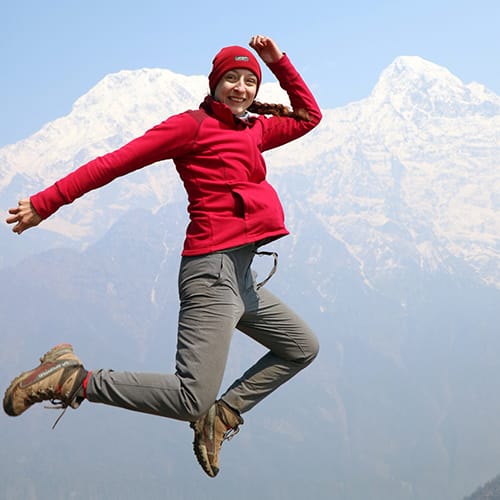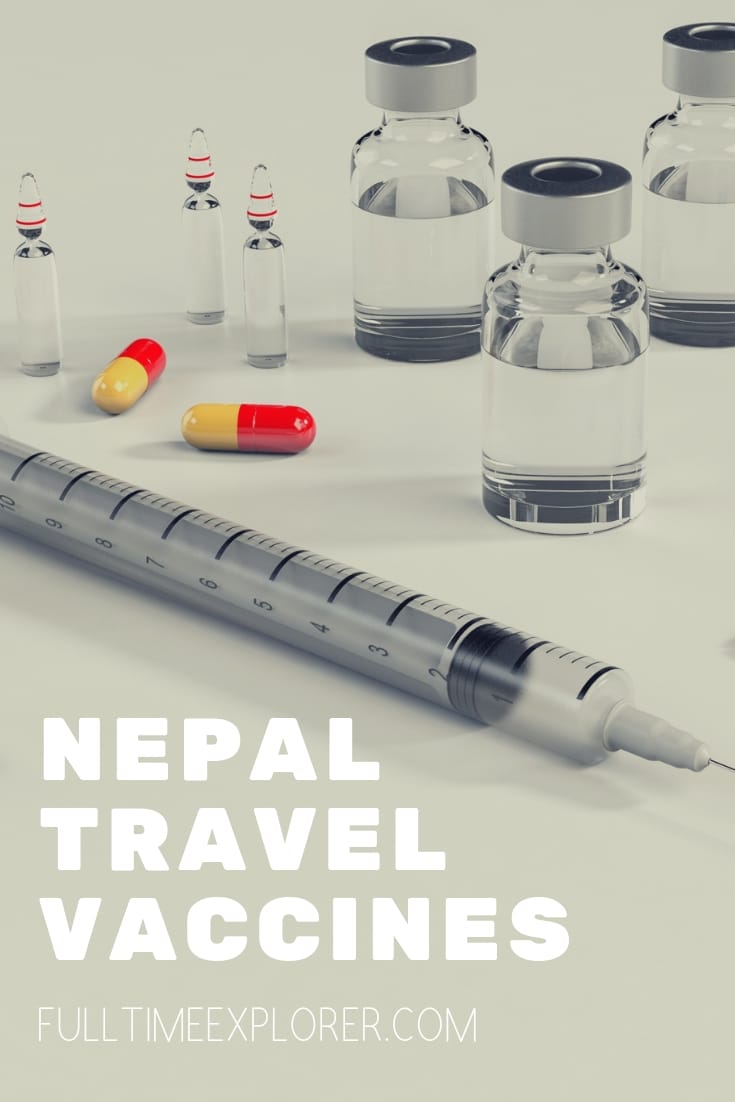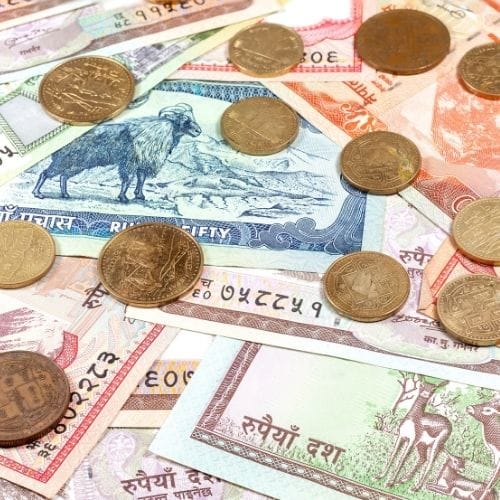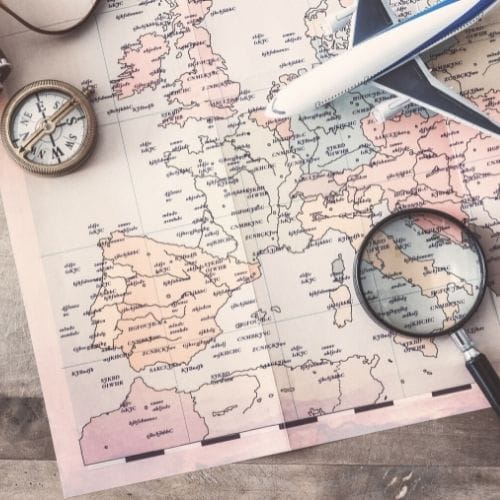Choosing vaccinations for Nepal can be a little confusing and daunting. The list is a mile long and if you live in the U.S. you’ll find it’s definitely not cheap. While insurance companies cover some of these vaccinations for Nepal, a lot of them will need to be paid out-of-pocket. My first time getting vaccines, I spent over $1,000! Luckily, I travel a lot, and most of the vaccines last several years. It ended up being worth it for me, whereas this can be a huge deterrent for others who just want a two-week vacation. So, which vaccines are recommended prior to visiting Nepal?
It’s important to be up to date on all routine vaccinations before visiting Nepal. Note, the prices included in this post are from 2018.
I want to start this post by clearly stating that I am not a doctor nor do I have any medical training. As a traveler, I can only share my personal experience along with research done on the CDC website and knowledge given to me from my doctors. It’s recommended that you speak to your own doctor to see what is best for you as each person is different.

Measles-Mumps-Rubella (MMR) Vaccine
What is Measles?
It’s a highly contagious virus that has symptoms including cough, fever, red eyes, and sore throat. It then progresses into a rash that starts at the head and works its way down.
How do you get Measles?
Measles is an airborne illness that is passed along through coughing and sneezing.
How long does the vaccine last?
20 years
My experience…
Since I was 28 when I started traveling to developing countries, I needed to get a new vaccine in order to be up to date. If you’re over 20 years old, you should look into this vaccine if the last time you had it was as a child. My insurance paid for this vaccine.
Diphtheria-Tetanus-Pertussis Vaccine
What is Tetanus?
Tetanus is an infection that causes lockjaw, making it hard to open ones mouth, swallow, and breathe.
How do you get it?
It’s most commonly contracted from open wounds that are not treated or cleaned properly.
How long does the vaccine last?
10 years
My experience…
Tetanus was a shot I had received twice prior to traveling, however it was out of date and needed to be updated. I decided to get this vaccine for Nepal simply because it’s very easy to accidentally cut oneself, and there isn’t always a place to get treatment nearby. Hospitals are easy to access in cities, but if you are trekking or in smaller villages, medical care is sparse. My insurance paid for this vaccine.
Varicella (Chickenpox) Vaccine
What is Chickenpox?
Chickenpox is a contagious disease that causes red itchy blisters to form on the skin.
How do you get it?
You can get Chickenpox if someone who is contagious touches you or breathes on you.
How long does the vaccine last?
10-20 years. If you have already had chickenpox, it’s rare to get it a second time.
My experience…
I had Chickenpox when I was little so it’s unlikely for me to have it again, therefore I did not receive this vaccine.
Polio Vaccine or Booster
What is Polio?
Polio is a disease that causes paralysis through the brain and spine. There is no cure and it can be fatal if it advances enough.
How do you get it?
Polio is most often spread through contaminated water.
How long does the vaccine last?
At risk adults should receive a booster every 10 years.
My experience…
I was shocked when I found out that Polio still exists in the world. Although I try to never drink contaminated water, it’s really hard to avoid it 100% of the time. Say you eat an apple and it was washed in contaminated water, you’re now at risk. To me, this shot was important. I paid $90 for this vaccine.
Yearly Flu Shot
A flu shot costs around $24. I never got the flu shot before traveling, but now, I get one every year. I’m not really sure if it’s worth it or not. I’d imagine that there are different forms of the flu in different countries and the shot given in the US might not protect against the flu in Nepal. That being said, the CDC highly recommends the flu shot when traveling to Nepal.
Hep A Vaccine
What is Hep A?
Hep A is a disease in the liver. Symptoms include yellow skin or eyes, fatigue, lack of appetite, and nausea.
How do you get it?
It’s spread through fecal matter entering ones mouth. It can also be spread by swallowing food or water that contains the virus.
How long does the vaccine last?
10 years
My experience…
While this sounds like something you could easily avoid, it’s not as easy as it sounds. In Nepal, many people do not use toilet paper. It’s customary for people to wipe themselves with their left hand. Although people wash their hands much more intensely than we do back home, you cannot guarantee everyone’s hygiene practices. If someone is serving your food and does not wash their hands properly, you could get Hep A. This vaccine was covered by my insurance.
Typhoid Vaccine
What is Typhoid?
Typhoid is a bacterial infection that causes a high fever, vomiting, and diarrhea.
How do you get it?
It is often caused by contaminated food or water. The CDC recommends this vaccine for adventurous eaters.
How long does the vaccine last?
3 years
My experience…
As mentioned above, hygiene is not always the best in Nepal. In addition, water is not potable which means that any food washed in contaminated water is also at risk of making you ill. Unfortunately, this vaccine was not covered by my insurance and only lasts 3 years. I paid $242 for this vaccine.
Hep B Vaccine
What is Hep B?
Hep B is a contagious virus. It’s symptoms include fever, fatigue, yellow skin, nausea, vomiting, dark urine, and joint pain.
How do you get it?
It can be contracted through sexual contact, blood transfusions, and contaminated needles.
How long does the vaccine last?
20 years
My experience…
I was already up to date on this shot, however I think it’s important to note that I got very ill in Nepal and had to go to a local hospital. While I did not need a blood transfusion, I did get poked and prodded with a lot of needles. One time, a needle was dropped on the uncleaned floor and was about to be reinserted into my vein. Luckily, I was awake and a nurse nearby stopped the person who appeared to be new. This was a vaccine I wasn’t too concerned with getting, and now, I see the importance of it.
Japanese Encephalitis Vaccine
What is Japanese Encephalitis?
JE is a disease that causes symptoms including fever, headache, vomiting, confusion, and difficulty moving. It can develop into swelling around the brain and coma.
How do you get it?
Through mosquito bites.
How long does the vaccine last?
Unknown, but the vaccine can be recommended every year if you’re still at risk.
My experience…
I got this series of shots before my first trip. It costs almost $700 (for two doses) and may not last longer than one year. Now, I use a lot of mosquito spray and hope I don’t get this. Personally, $700 is just too much to pay every year.
Rabies Vaccines
What is Rabies?
Rabies is a disease caused by a virus. Once symptoms show it can be fatal, so it’s important to treat it immediately.
How do you get it?
It’s transmitted through saliva (often from bites of infected animals).
How long does the vaccine last?
Boosters may be needed every 6 months to 2 years.
My experience…
I was told this vaccine costs $2,500 in the U.S. For obvious reasons, I decided not to get it. Avoiding rabid animals is not always super easy. Monkeys are common at certain temples and stray dogs are common in most of Nepal. I’ve personally never had a problem. If you do get bit by an animal, you’ll need to go to a hospital and get treated with two shots. I’ve been told that even if you are vaccinated, you still need to go to a hospital to get one shot.
Malaria Pills
What is Malaria?
Malaria causes severe flu-like symptoms. If untreated it can cause death.
How do you get it?
It is transmitted through mosquito bites. Most areas in Nepal are not at risk, however areas like Lumbini and Chitwan are.
How do you use the pills?
Malaria pills should be taken daily while in areas at risk. It should also be taken a few days before arriving and a few days after leaving. Consult your doctor for exact instructions. The pills cause some people to have very bad nightmares.
My experience…
I used these pills in other countries with high risks of Malaria, and they did not have a negative side effect on me. I have not used them in Nepal. I’ve heard from people who have gotten Malaria before that it was the worst thing they’d ever experienced. Still, I find the chances of getting Malaria small enough that I don’t take the medication. Maybe if you are spending a lot of time in the plains of Nepal, you may want to consider taking them. With insurance, these pills were $10, without insurance they were $230 for 30 pills.
Yellow Fever Vaccine
You will only need a Yellow Fever vaccine if you are coming from a country with Yellow Fever or have visited a country with Yellow Fever recently. You may be asked to present proof upon entering Nepal.
You might also like…

Michelle Della Giovanna
Writer at Full Time Explorer
I’m just your average New Yorker who quit her job in the fashion industry to explore the world. Come find out what it’s like to trade in five-inch heels for squat toilets.




Leave a Reply